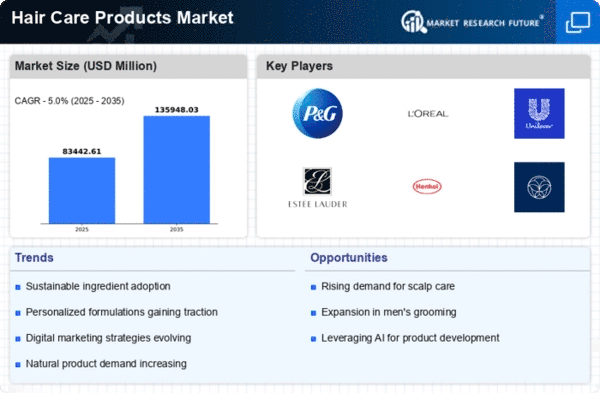Top Industry Leaders in the Hair Care Products Market
 The competitive landscape of the hair care products market is marked by intense competition among key players, each striving to capture a significant share in this dynamic industry. As of 2023, a set of key players dominates the market, employing diverse strategies to meet evolving consumer needs and stay ahead in the competitive landscape.
The competitive landscape of the hair care products market is marked by intense competition among key players, each striving to capture a significant share in this dynamic industry. As of 2023, a set of key players dominates the market, employing diverse strategies to meet evolving consumer needs and stay ahead in the competitive landscape.
Key Players:
Amway Corp
Coty Inc
Henkel AG and Co KGaA
Kao Corp
L'Oréal SA
LVMH Moët Hennessy Louis Vuitton
Revlon Inc
The Estée Lauder Co Inc
The Procter and Gamble Co
Johnson and Johnson
The Unilever Group
Strategies Adopted:
Strategies adopted by these key players revolve around product innovation, brand diversification, and sustainability. L'Oréal, for example, invests heavily in research and development to introduce advanced formulations and capitalize on emerging trends. Procter & Gamble leverages its diverse brand portfolio to cater to various consumer segments and preferences. Unilever places a strong emphasis on sustainable practices, introducing eco-friendly packaging and promoting ethical sourcing of ingredients. Henkel focuses on strategic acquisitions to expand its product portfolio and geographic reach. Shiseido, known for its premium offerings, emphasizes quality and brand exclusivity.
Market Share Analysis:
The hair care products market is influenced by factors such as brand recognition, product efficacy, pricing, and the ability to adapt to changing consumer preferences. Companies that can successfully communicate the benefits of their products, tailor offerings to diverse hair care needs, and establish a strong retail presence tend to secure a larger market share. Additionally, effective marketing campaigns, partnerships with hairstylists and influencers, and a robust online presence contribute significantly to market penetration.
News & Emerging Companies:
The hair care products market have been making waves in 2023, capitalizing on niche markets, clean beauty trends, and innovative formulations. Startups such as Function of Beauty and Ouai have gained popularity by offering customizable hair care solutions directly to consumers. While their market share may be relatively modest compared to industry giants, their ability to tap into personalized and sustainable beauty trends poses a competitive challenge.
Industry Trends:
Industry trends underscore the industry's focus on sustainability, technology, and inclusivity within the hair care products market. Companies are investing in eco-friendly packaging, reducing the use of harmful chemicals, and incorporating natural and organic ingredients. Additionally, investments in digital marketing, e-commerce capabilities, and virtual try-on tools reflect the industry's adaptation to changing consumer shopping behaviors.
Competitive Scenario:
The hair care products market reflects a blend of established players, emerging disruptors, and a shared commitment to innovation and sustainability. Key players maintain their dominance through extensive product portfolios, brand strength, and global distribution networks. Emerging companies contribute to the market's dynamism by introducing novel approaches, customization options, and eco-friendly solutions. The competition is further intensified by the entry of direct-to-consumer brands, private labels, and the increasing influence of e-commerce platforms in shaping consumer choices.
Recent Development
The hair care products market is characterized by a mix of established players and emerging disruptors, all navigating a landscape shaped by changing consumer preferences and a growing emphasis on sustainability. Key players maintain their market leadership through innovation, brand strength, and diverse product offerings, while emerging companies contribute to the industry's evolution with fresh perspectives and targeted solutions. As the hair care products market continues to evolve, companies that can adapt to consumer demands for personalization, sustainability, and technological integration are poised for success in this competitive and rapidly evolving sector.











